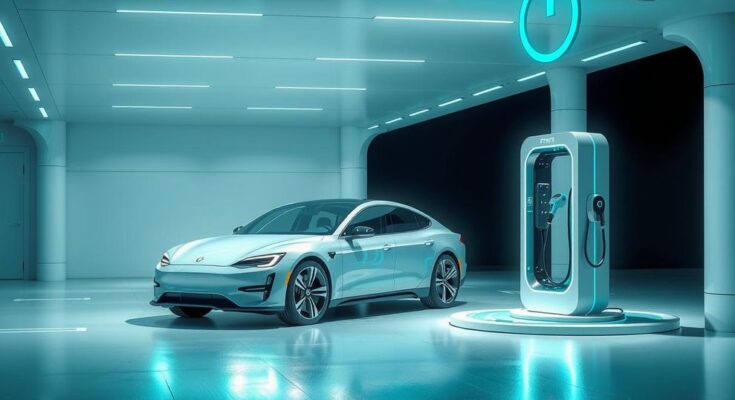Chinese automaker BYD has developed breakthrough five-minute EV charging technology, compelling Tesla to reassess its strategies amid declining investor confidence. Audi and Alfa Romeo are slow to commit to full electrification, while Nissan partners with SK On for U.S. battery production. The dynamics of EV adoption may substantially change with advancements in charging infrastructure.
Recently, Chinese automaker BYD has made significant strides in the electric vehicle (EV) sector with a revolutionary five-minute fast-charging technology. This advancement poses a challenge to Tesla, particularly as investor confidence in the American brand wavers. BYD’s upcoming Super e-Platform EVs will retail for approximately $38,000 and offer an impressive range of 250 miles in just five minutes of charging, shifting the narrative in the EV market considerably.
On the other hand, Tesla’s stock price has experienced a decline, reflecting growing skepticism regarding the brand amid the competitive landscape. With competitors rolling out new models, Tesla’s comparatively dated lineup raises questions about its market leadership. Concurrently, Elon Musk’s controversial political engagements may further tarnish Tesla’s image and investor trust, opening the door for competitors like BYD to capitalize on this gap.
Meanwhile, established automakers such as Audi and Alfa Romeo are reconsidering their aggressive all-electric commitments in light of BYD’s advancements. Audi’s management highlighted the need to reassess timelines regarding the transition to electric vehicles, acknowledging that fully switching to electric might require more time than projected. Alfa Romeo’s leadership confirmed that future models would continue to offer combustion engines alongside electric powertrains, indicating a strategic retreat from previous commitments to electrification.
In contrast, Nissan has announced a partnership with South Korean battery manufacturer SK On, focusing on producing high-performance batteries for its upcoming EV lineup. This collaboration will yield nearly 100 GWh of batteries for Nissan’s electric vehicles produced in the U.S. by 2033. This initiative aims to enhance Nissan’s competitive edge in the evolving EV landscape while generating local employment and investing substantially in U.S. manufacturing.
The fast-paced evolution of EV technology raises critical questions about market dynamics. Would ultra-fast charging capabilities alter consumer perceptions and drive EV adoption in the U.S.? If affordable models offering quick charging become available, consumer acceptance, even from foreign manufacturers, may significantly shift the landscape, ultimately benefiting the ecosystem of electric mobility.
In summary, BYD’s breakthrough in ultra-fast charging presents a serious competitive threat to Tesla, whose market position is increasingly scrutinized. Established manufacturers like Audi and Alfa Romeo are reconsidering their electrification timelines, highlighting the challenges of adapting to a rapidly changing industry. Conversely, Nissan’s partnership with SK On signals a more proactive approach to EV development in the United States. The future of EV adoption may hinge on technological advancements and manufacturers’ ability to respond to market demands sustainably.
Original Source: insideevs.com




